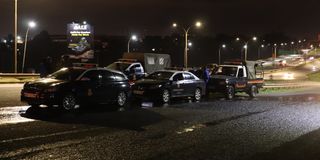The unruly meet ham-fisted police

Police vehicles on standby at Thika Superhighway's Exit 7 as police officers await to block curfew violators in Nairobi on April 19, 2021.
What you need to know:
- Right now, the people, usually exuberant and disobedient, are thoroughly cowed.
- Getting around in the late afternoon and early evening has become a complicated, exercise.
After the police started blocking the roads, getting home has become an interesting, touch-and-go affair. This whole curfew enforcement thing has become a commentary on the responsibilities of the State, the rights of the citizen and which of those two is the more important.
Right now, the people, usually exuberant and disobedient, are thoroughly cowed. They are obeying orders in sullen fear, not because they have reformed.
Getting around in the late afternoon and early evening has become a complicated, exercise. If you are going to Thika Road and it is after six o’clock, you can’t just get onto that highway, usually a delight late at night and a complete disaster the rest of the time.
One is more likely to head to Kilimani, Kileleshwa, onto the back of Lavington to avoid James Gichuru-Wayaki Way junction, up to Kangemi to change lanes, Nyari, Gigiri, Runda and into Kiambu Road. It’s rather like the 40 years wandering and getting lost in the wilderness.
I was rather amazed to see people in the dark in Gigiri at 7pm running, in panic, trying to get home before curfew and before the spikes are rolled out. If you work in a shop or other small businesses, you have to stay open till 7pm, then you have to take a matatu — which start thinning at 6.30pm to town and connect to Kitengela, Rongai or wherever it is you live. It is delicate, and a lot more complex, than a fat cat driving out of the city centre to Kiambu Road.
There is no denying that our lack of civic discipline has provided the State an opportunity to unleash the iron fist. A friend who lives in Japan tells me that the people are effortlessly organised; there is a thermometer at the door and everyone checks their temperature on the way out. If your temperature is yaw-yawing, you go back to the house. You call the doctor and are probably advised to stay at home and manage your symptoms until there is real need to call a medical team. Everyone does what they are supposed to do effortlessly and automatically, there is no need to involve the police, much less use force.
People behave badly
One of my friends upcountry, prosperous man, is unbelievably hardworking. Up long before dawn, on his feet the whole day and well into the night. During the first national lockdown, he kept up his busy schedule all the way to curfew, sometimes past the lock up time.
Here in Nairobi, a few months ago I passed by a popular joint in the Ngara area and I was horrified. People were packed together in the normal way, drinking, talking, laughing, touching. The staff happily mingled with the patrons, taking orders, chatting, serving. In the car park, another big group had parked and people were seated on their bonnets and inside their cars, a beer in hand. They talked, laughed and generally enjoyed human contact. There wasn’t a mask in sight.
Ordinarily, the bars on Kiambu Road are so packed with humanity, without an inch of parking, cars blocking the road, so much human and vehicular traffic that officers are required to keep things moving. A huge black cloud, like a witch’s evil spell, will normally hang over the whole area from the grills where juicy meat would pouring fat on hot coals. My people stuff their bodies with meat, gin, whisky and beer in copious quantities.
Back in the village, police officers from a spanking new police station — which my friend may have contributed to build — trailed, tracked and stalked the man the way a lion stalks deer. They finally pounced and dragged him to the station where they beat him the whole night, according to the villagers. When they released him the following morning, he couldn’t leave. He had to call for help to be carried out. And in the city, the coronavirus was scything through the people like a runaway freight train. Infection rates went beyond 20 per cent and down came down the lockdown and out rolled the spikes.
The question is, if the people behave badly, disobey public health and safety orders, conduct themselves in a manner that compromises their own interests and those of others, when they thoughtlessly put their own lives, those of their families, neighbours and everyone else in the community at risk, do they surrender their claim to human dignity, the right to be protected from torture and degrading treatment? If all power stems from the people and that they are the bosses, can the government, their servant, whip them and club them with sticks?
***
I am writing this in a dark estate. Kenya Power hasn’t been able to get electricity into our area for almost 24 hours. The young people are saying “Kukinyesha, Kenya Power wanaanua waya yao” (When it rains, Kenya Power take in their cables like washing.) What amuses me is that come the end of the month, my fictitious bill will be even more inflated than last month when I didn’t have such a long spell of darkness. We are not only overtaxed, we also pay for the same stuff many times over: I generate my own power but also pay somebody for it. Just like I pay for my own security but also pay for a police force.





